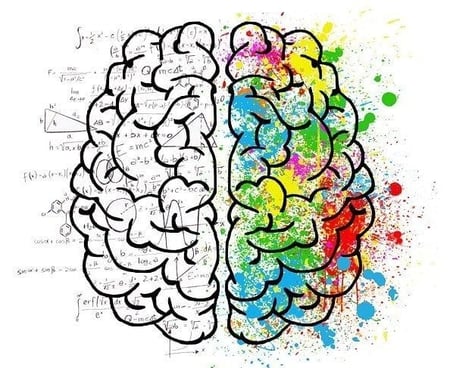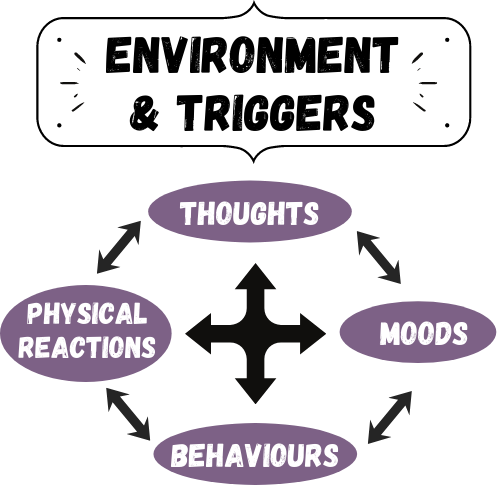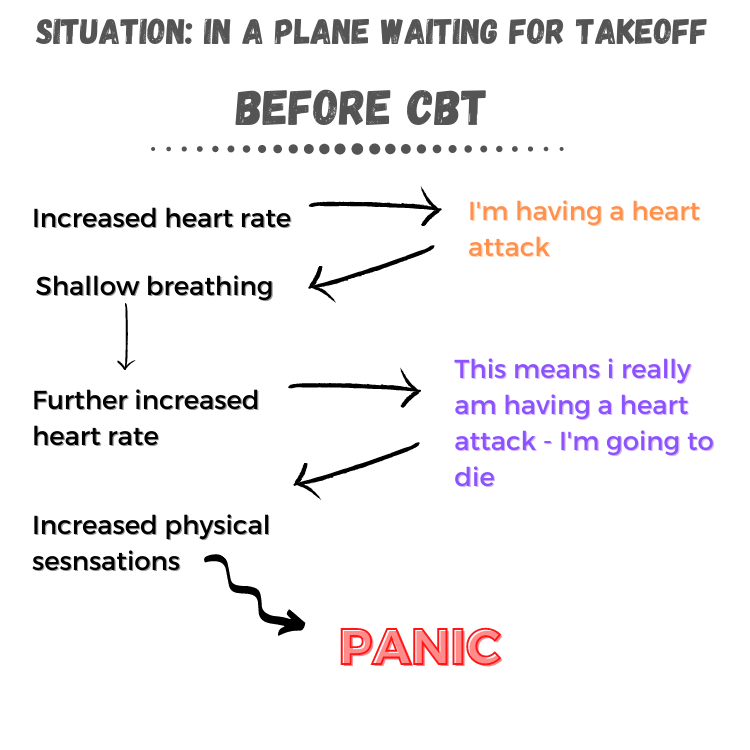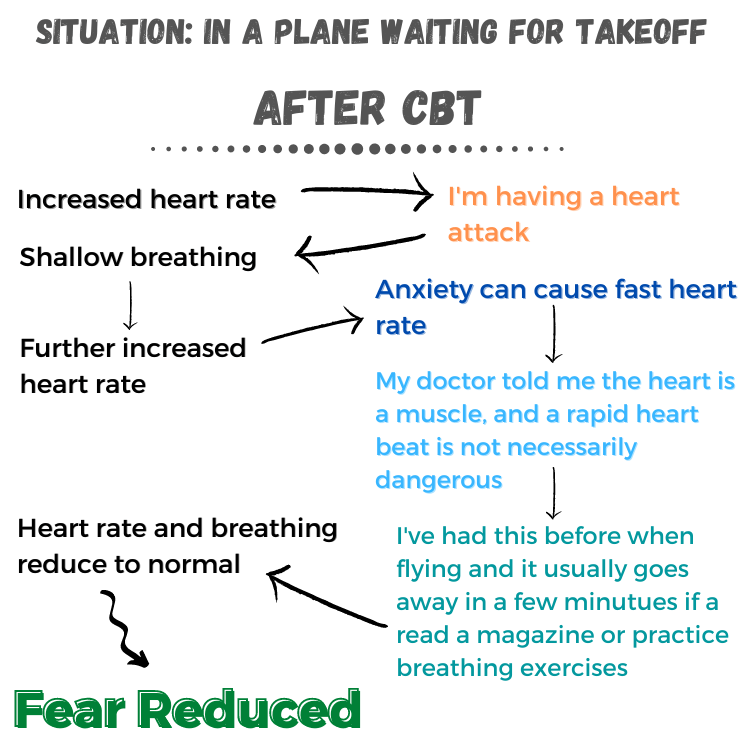Cognitive Behaviour Therapy
CBT Helps You Challenge Thoughts, Beliefs and Attitudes

Cognitive Behaviour Therapy (CBT)

Our thoughts about a past experience or current event have a substantial impact on the emotional, behavioural and physical reaction we have to it.
Cognitive Behavioural Therapy (CBT Therapy) is a mental health therapy focused on challenging 'cognitive distortions' to understand negative thought patterns and build coping strategies for current problems.
CBT will give you the tools and teach you methods and skills that have been clinically proven to be helpful for a wide range of day to day and longer term mental health challenges.
The skills developed with your Cognitive behaviour therapist will help you handle stress and anxiety (or worry) better, increase confidence, improve inter-personal relationships and become less fearful.
Common challenges addressed with CBT
CBT empowers you with practical tools to manage a wide range of mental health challenges and build lasting resilience.
- Depression
- Anxiety
- Anger
- Panic
- Mood Disorders
- Addictions
- Jealousy
- Eating Disorders
- Stress
- Low Self-Esteem
- Body Image
- Guilt
- Grief
- OCD
- Plus other issues unique to you
- Depression
- Anxiety
- Anger
- Panic
- Mood Disorders
- Addictions
- Jealousy
- Eating Disorders
- Stress
- Low Self-Esteem
- Body Image
- Guilt
- Grief
- OCD
- Plus other issues unique to you
How CBT Therapy Works
Cognitive Behaviour Therapy teaches you to be aware of how triggers in your environment impact your thoughts, physical reactions, moods and behaviours.
All 5 elements are interconnected and each part will influence other aspects of our life. Gaining an understanding of how these different parts interact will play a significant role in understanding our problems and the influence we have on each element.
CBT helps break down overwhelming problems into smaller parts to both help understand and confront challenges.
Even minor improvements in any of these elements play a large role in influencing positive change in other areas.

The CBT Therapist's role is to help you develop effective strategies and coping mechanisms to reduce or eliminate symptoms of distress. Outside of therapy you would have the tools needed to manage your symptoms or distress.
Although Cognitive Behaviour Therapy is very effective for a majority of mental health challenges, other therapies such as EMDR Therapy can be utilized for issues such as trauma and Dialectical Behaviour therapy (a sub-set of CBT Therapy) can be used for more complex issues such as Borderline Personality Disorder.
What's the difference between CBT and DBT Therapy?
In-between therapy sessions your therapist may assign you CBT Therapy homework, where you put into practice and develop some of the skills you have learned to propel yourself to the change you are looking for.
Lets us Help you Find the Right Match
How Can CBT Therapy Help?
CBT is a problem focused practical psychotherapy designed to help address mental health issues in an effective manner. Multiple studies have found CBT therapy to be highly effective in managing symptoms from a multitude of common mental health challenges such as depression, anxiety etc.
By becoming aware of your 'automatic thoughts', attitudes and beliefs during stressful or triggering situations, you can learn to change how you feel, think and act to various situations. Learning the tools of CBT will help you in your day to day life, not only during the course of your therapy, but through the future.


What Does a CBT Therapy Session Look Like?
Support Starts Here
Discover how CBT can shift unhelpful thinking, ease anxiety, and help you move forward with confidence.

CBT focuses on the here-and-now—on the problems that come up in day-to-day life. CBT helps people to examine how they make sense of what is happening around them and how these perceptions affect the way they feel
Canadian Mental Health Association
In many studies, CBT has been demonstrated to be as effective as, or more effective than, other forms of psychological therapy or psychiatric medications.
World Health Organization
FAQs
Therapy works best when the 'fit' is right with your therapist. That’s why we carefully match you with someone whose expertise fits your needs and preferences. Building a strong therapeutic relationship is key to creating a supportive and effective experience.
Before meeting your therapist, you’ll complete a brief intake form. Your first 50‑minute session focuses on what brings you in, your goals, relevant history, and what success would look like. We’ll explain confidentiality and co‑create a plan so you know what comes next. It’s normal to feel nervous—your therapist will guide the pace.
The frequency of sessions depends on your needs and goals. Many people start with weekly or bi-weekly appointments and adjust as they make progress. The total number of sessions is unique to you—your therapist will work with you to find the right approach.
Cognitive Behavioural Therapy (CBT) is a structured, goal-oriented approach that focuses on the connection between your thoughts, feelings, and behaviours. In sessions, your therapist will help you identify unhelpful thought patterns, explore how they affect your emotions and actions, and practice practical strategies to shift them.
CBT is collaborative—you’ll work together to set goals, practice new skills, and apply tools between sessions. Over time, these changes can make it easier to manage challenges like anxiety, depression, or stress, and support long-term resilience in daily life.
Most of our services are covered by extended health benefit plans. Coverage varies with every plan, so please check your specific plan or contact your provider to confirm your benefits.
Most employer benefits cover therapy with a Registered Social Worker (MSW, RSW) or a Registered Psychotherapist (RP). We can direct bill to most major insurers when your plan allows it; otherwise, we email insurance‑ready receipts after your session.

Last Reviewed Aug 5 2025 by Amy King
Amy is a Registered Social Worker with the OCSWSSW, as well as a member of the OASW. She completed her Masters Degree in Social Work at the University of Montreal and also holds an MA in political science as well as a Bachelor of Arts degree in English Language & Literature and Philosophy from Wilfrid Laurier University. Amy completed an additional post-graduate training certificate in CBT Therapy from Wilfred Laurier University and EMDR Therapy.
Not sure yet? Let’s talk it through.
If you’d like to ask questions or explore your options first, book a free 20-minute matching consult or give us a call (226-752-8857) . One of our team members will help you find the right therapist and next steps that feel comfortable for you.
%20(1).png?width=200&height=80&name=Trillium%20Counselling%20Logo%20(999%20x%20398%20px)%20(1).png)

















